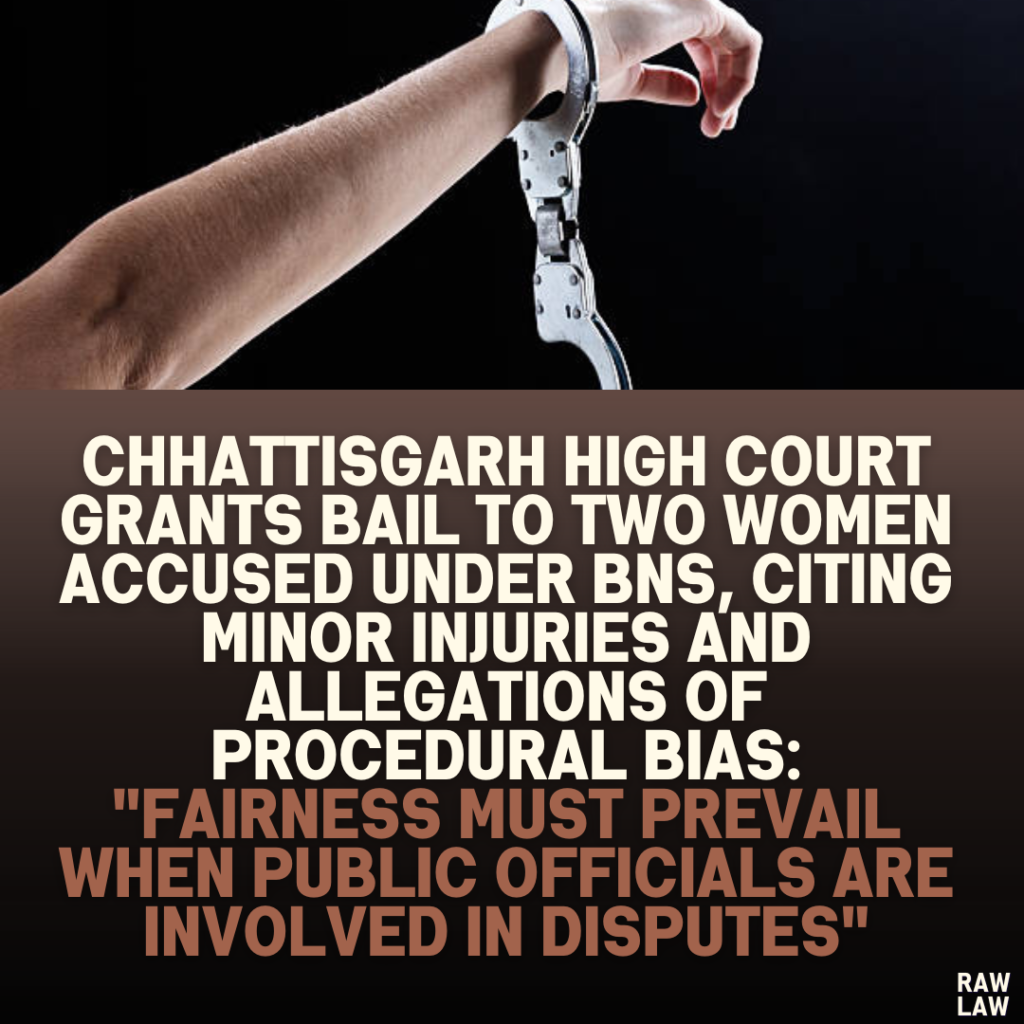Court’s Decision:
The High Court of Chhattisgarh granted regular bail to two women accused under Sections 296, 115(2), 109, and 3(5) of the Bharatiya Nyaya Sanhita (BNS), 2023, in connection with allegations of assaulting their neighbor and his mother. The court observed that the injuries sustained by the complainant were of a simple nature and that there were claims of procedural bias due to the complainant’s influence as a police constable. Considering the applicants’ circumstances, including one being a young mother and the other an elderly woman, and the absence of a charge sheet, the court held that bail was justified.
Facts:
- The applicants, a 24-year-old woman and her 60-year-old mother-in-law, lived next to the complainant.
- The complainant alleged that during a boundary dispute, the applicants began breaking the fence around his orchard. When he objected, they abused him and his mother, threatened them with harm, and physically assaulted them with a sickle, causing injuries to their fingers.
- The applicants, however, claimed that the complainant and his wife, both serving as constables, abused their official positions to suppress the applicants’ complaint and filed a false FIR to shield their actions. The applicants alleged that during the incident, the complainant tore the younger applicant’s clothes and physically assaulted her family, but their complaints were ignored by the local police.
- The applicants further stated that they approached senior authorities after the police station refused to register their complaint, and their grievances remained unresolved.
Issues:
- Whether the applicants were entitled to bail given the allegations of assault and procedural bias.
- Whether the complainant’s role as a police constable affected the investigation’s impartiality.
Petitioner’s Arguments:
- The applicants argued they were innocent and were falsely implicated by the complainant who misused his official position as a police constable.
- They highlighted the procedural bias, as their attempts to lodge an FIR were ignored, even after escalating the matter to higher authorities.
- The applicants also stressed the minor nature of the alleged injuries and the fact that they had no significant criminal history, apart from one minor antecedent for one of the applicants. They cited personal hardships, including the younger applicant being a mother to a 5-month-old child, to further support their plea for bail.
Respondent’s Arguments:
- The State opposed the bail application, emphasizing the severity of the allegations, which involved breaking the fence, hurling abuses, issuing death threats, and physically assaulting the complainant and his mother with a sickle.
- The State contended that the injuries to the complainant and his mother, while simple, demonstrated the applicants’ aggressive behavior.
- It was also argued that one of the applicants had a prior criminal antecedent, which should weigh against granting bail.
Analysis of the Law:
The court examined the relevant provisions of the Bharatiya Nyaya Sanhita (BNS), 2023, particularly those related to bail and procedural fairness. It noted:
- The applicants’ allegations of procedural bias and the failure of the police to register their counter-complaint, which raised concerns about the fairness of the investigation.
- The principle of granting bail in cases where prolonged detention is unnecessary, especially when the injuries were minor and did not justify continued incarceration.
Precedent Analysis:
The court relied on principles from previous judgments that stress:
- The presumption of innocence until proven guilty.
- The right to bail when the alleged offense is not severe, and there is no evidence suggesting that the accused might abscond or tamper with evidence.
- The court’s duty to ensure fairness, particularly in cases where allegations of abuse of authority arise.
Court’s Reasoning:
The court reasoned as follows:
- Nature of Injuries: The injuries sustained by the complainant and his mother were simple and did not justify prolonged detention of the applicants.
- Procedural Fairness: The applicants’ efforts to lodge a complaint were obstructed, raising concerns about the complainant’s misuse of his position as a police officer.
- Circumstantial Factors: One applicant was a young mother, and the other was an elderly woman. These personal circumstances warranted a lenient view, especially in the absence of a charge sheet.
- No Significant Criminal History: The applicants had no major criminal antecedents, apart from one minor antecedent for one applicant.
Conclusion:
The court granted bail to the applicants, subject to strict conditions, including:
- Furnishing personal bonds and sureties.
- Undertaking not to seek adjournments during evidence hearings.
- Ensuring their presence at trial dates.
- Refraining from misuse of bail liberty or absconding, failing which proceedings would be initiated under the BNS.
Implications:
This judgment underscores:
- The importance of ensuring fairness in cases involving allegations against public officials.
- Judicial recognition of personal hardships as a factor in bail decisions.
- The principle that minor injuries and procedural discrepancies should not lead to extended incarceration of accused persons, especially in cases involving vulnerable groups like women and children.




Pingback: Jammu & Kashmir High Court Affirms Educational Trust’s Exclusive Ownership Over Suit Pathway; Rejects Appellants’ Easementary Claims for Lack of Evidence Under Order 39 Rule 1 and 2 CPC - Raw Law